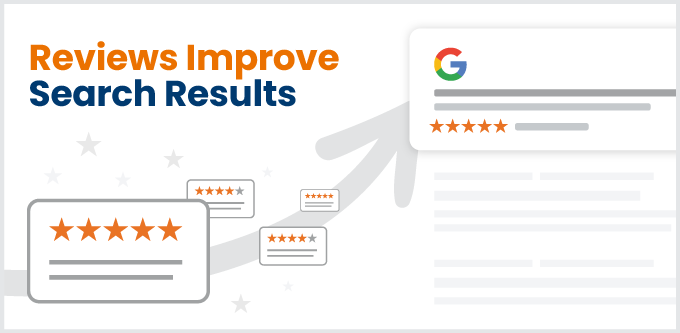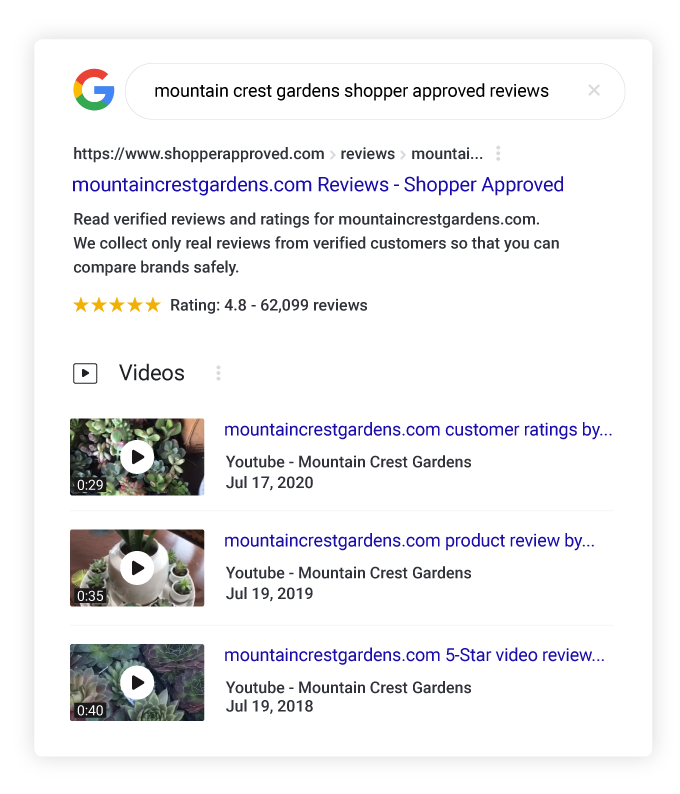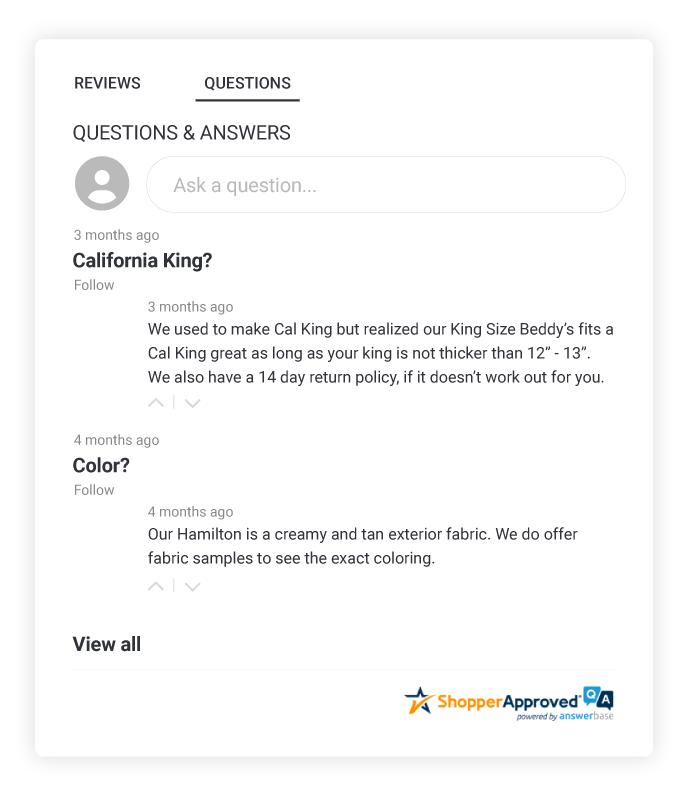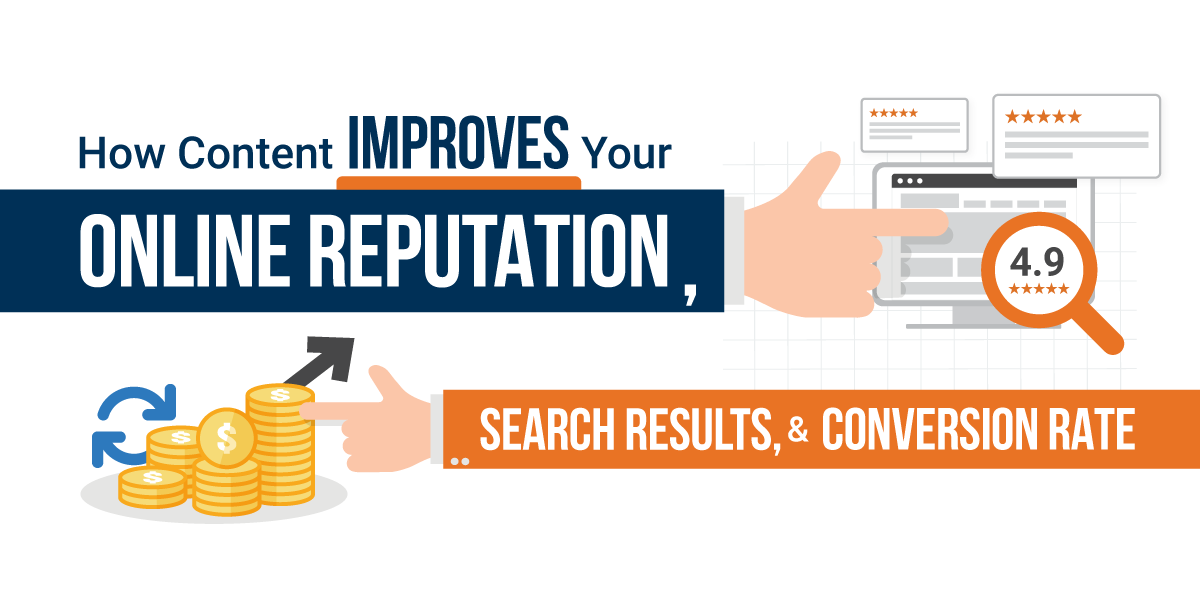How Content Improves Your Online Reputation, Search Results, and Conversion Rate
Table of Contents
IntroductionWhat You Will Learn
Two Things Are Vital to Success?
All-About-Content
What Is Online Content?
Who Should be Creating Content?
Why Is Content Important for SEO?
What Form of Content Is Best?
Content Improves Your Reputation
Content Improves Search Results
Content Improves Conversions
Merchant and Product Reviews
Reviews
Reviews Improve Your Reputation
Reviews Improve Search Results
Reviews Improve Conversion Rates
Product-Reviews
Product Reviews & Reputation
Product Reviews & Search Results
Product Reviews Conversion Rates
Seller-Ratings
Seller Ratings Improve Reputation
Seller Ratings & Search Results
Seller Ratings & Conversion Rates
Video-Reviews
Video Reviews and Reputation
Videos Improve Search Results
Video Reviews Conversion Rates
Q&A
Q&A Improves Your Reputation
Q&A Improves Your Search Results
Q&A and Your Conversion Rate
Summary
Action Items
How Shopper Approved Can Help
Further Reading
How Content Improves Everything
What You'll Learn in This Article
By the time you are done reading, you’ll walk away with five key pieces of knowledge that will help you generate traffic and revenue on your website:
- Why content matters for your website’s reputation and search engine rankings.
- How to leverage content to create click-throughs to your store.
- Why user-generated content such as reviews and ratings is so influential to shoppers.
- How Q&A and video reviews can drive even more traffic to your store from across the web.
- How displaying ratings and reviews on your website can decrease cart abandonment, resulting in greater conversions and increased sales.
Now, let’s dive in with one fundamental question:
What Two Things Are Vital to Web Store Success?
In two words, “traffic and conversion” are the two fundamental things that every online store or eCommerce website needs in order to increase business. In fact, this combination is the very lifeline that will either keep you growing—or stall your success.
1. Low-cost, high-quality organic search traffic: Search results are critical to your overall website success, and organic traffic reduces your customer acquisition costs and drives higher profit margins.
Online, organic search results are improved when Google finds the best content or answer to a search query. In addition, Google and consumers also look for user-generated content (UGC) and social proof (such as ratings and reviews), as this type of content is often seen as more trustworthy and authentic.
Organic search traffic also plays an important role in online reputation management, which is how your brand is perceived by search engines and users across the web. The better your reputation for high-quality information and answers, the more successful your website will be.
2. A higher conversion rate: Once traffic (i.e. potential customers) have reached your site, the goal becomes to move the visitor through your sales funnel and convert the visit into a sale.

Organic traffic that comes from bottom-of-the-funnel, long-tail searches made up of specific questions about a product or solution converts at a higher rate. In fact, we have seen this Q&A type of traffic convert up to 75% of the time for an eCommerce site.
Improving either, or both, of these key performance metrics will generate several financial benefits for any website:
- Lower customer acquisition costs
- Higher revenue per visitor
- More gross profit
- More net profit
Improving both traffic and conversion simultaneously and cost-effectively is a surefire path to online success and profits. How do you do this? Begin with quality content throughout your site. Great content created by your users, your team, and other experts, will enhance your reputation, drive traffic, and increase your conversion rate.
What Is Online Content?
Online content is anything that helps convey information, facts, or stories to educate, inform, or entertain your audience. This typically and traditionally takes the form of text, but it can and should also include what is known as rich media, such as video, pictures, micrographics, infographics, charts, graphs, drawings, slides, audio, and anything else that will help educate your audience.
Rich media content enhances the engagement and learning experience by conveying your information in multiple modalities and formats that accommodate all the different ways people learn. Google loves rich media because people generally prefer it as well, making your content more attractive, engaging, consumable, and shareable.
Who Should be Creating Content for Your Website?
There are three types of content that can help improve search engine results, traffic, and conversions. These can be categorized based on who created the content.
- User-Generated Content: Customer reviews, social media posts, and forum posts.
- Expert-Generated Content: Reviews, comparisons, and buyer guides from experts.
- Brand-Generated Content: Product descriptions, articles, and how-to resources created by the seller.
Each of these content types has its advantages; together, they create a powerful reputation of authenticity, value, and expertise for your business throughout the web. Content from any of these creators may appear on your website, as well as on third-party sites such as social media, review platforms, and other forums and online venues.
User-Generated Content: A study by Stackla found that 79% of people say that user-generated content highly influences their purchasing decisions. One of the biggest benefits of user-generated content, or UGC, is that it is honest and authentic material that promotes greater trust in your brand. When potential customers learn about the experience others have had with your website and products they gain trust, which enhances your reputation, driving engagement, traffic, and sales.
Within the UGC category, there are several subsets:
- Social proof - Reviews and testimonials about a company, seller, and/or product. May be in written or video form.
- User-generated Q&A - Users answering product and service questions posed by other customers and shoppers.
- User communities and forums - Pages dedicated to community discussions of tips, use cases, brand fandom, troubleshooting, and other topics.
- Blog comments - Responses to a specific article, on the same page as that article.
- Social posts - Posts from customers, brand advocates, and influencers on any social media site.
Expert-Generated Content: Recommendations and exposure from experts who hold trusted knowledge in your brand’s business niche are excellent ways to build brand credibility. You can also invite experts from related industries to create guest articles (or other content) for your website or channels.
Brand-Generated Content: No one knows the intricacies of your brand better than you do. Brand-generated content gives you the chance to tell your story and make a connection with users through content that conveys your values while sharing crucial information.
Why Is Content Important for SEO?
Content is important for SEO (search engine optimization) because it helps search engines understand the topic of a website and determine if it is relevant to a user's search query. Content also helps to build engagement and trust with users, increasing website traffic and indicating to the search engine that your page is valuable to users interested in that topic.
When creating content for your website, it's important to consider both the needs of your users and the requirements of search engines.
- Relevance: Search engines try to match the most relevant webpages to a user's search query. By featuring high-quality, useful content, you can increase the chances that your pages will be ranked highly for relevant search terms.
- Keywords: Including relevant keywords in your content can help search engines understand the topic of your webpage and improve its ranking for those terms. However, it's important to use keywords naturally and avoid stuffing them into your content.
- User engagement: Engaging and informative content can keep users on your website for longer periods of time, which can signal to search engines that your website is valuable and worthy of a higher ranking.
- Link building: High-quality content can attract links from other websites, which can help improve your website's ranking because search engines view links from other reputable websites as a sign of trust and credibility.
Great content is key to building brand awareness and trust in a competitive market flush with information. Without putting content out there for customers to view and learn from, your brand risks remaining hidden from searchers who then never become customers.
What Form of Content Is Best to Have on Your Website?
Google can read and index all forms of content. The more content types you offer, the better, as the top Google search results may serve up a video, an image, or a listicle—or even more than one content type for the same search. Make sure you are maximizing your search results by offering multiple content types.
On top of that, different users may be interested in differing forms of content. Creating a mix of articles, videos, infographics, and other types of content will increase the likelihood of visitors engaging with and learning from your content, ultimately seeing your company as an expert, reliable source of solutions to their needs.
How Does Content Improve Your Website’s Reputation?
As your content drives traffic and brings visitors to your website, search engines and other users will begin to take notice. As your audience grows and becomes engaged with your brand, you start to build a positive reputation. When your site has high-quality answers and relevant content, people will see you as a valuable resource for expertise and solutions.
Today, customers have high expectations when it comes to content. They demand high-quality and fresh, up-to-date information. All content must have high value to stand out and capture user attention. It should answer vital questions and build user trust by being relevant, factual, and unbiased.
A constant stream of high-value content has many benefits:
- Higher visibility: SEO efforts flourish with the consistent posting of fresh, high-quality content.
Trust building: Content creation lets you answer queries and concerns that address issues brought up through feedback and customer interaction. Establishing a pattern that shows that you are serious about addressing the needs of your customers is a big step toward building a positive reputation. - Audience retention: Prospects and existing customers will return for more if you gain their attention and continually provide a customer experience that is memorable.
- Better leads: Providing plenty of relevant, specific information in text, graphic, and video forms will attract customers to your site and prime them for the next stage in their buyer’s journey.
Improved conversions: Quality content educates visitors and resolves their concerns. A compelling call-to-action directs them to the right product page, guiding them to follow through and make a purchase. - Established authority: Part of building your reputation involves showing your authority. Why should users trust your brand? Your content highlights your experience and knowledge, marking you as an expert in your industry.
- Greater loyalty: You may even gain brand advocates that fall in love with your brand and tell others about their experience, acting as zero-cost marketing.
Another great way to use content to boost your reputation is through customer interactions, both on your own website and through your social media channels. Utilizing these platforms gives you a chance to interact with customers in real-time, providing the latest news and starting a conversation about what matters, both within your brand and the world.
Effectively leveraging content is one of the best ways to build your brand’s reputation, expand your reach and audience base, and ultimately generate more leads and improve your conversion rate.

How Does Content Improve Search Results?
Content improves search results by providing relevant and useful information to users. When a search engine crawls a website, it looks at the content of the webpage to determine what the page is about and how relevant it is to a user's query, especially in comparison to other, similar pages.
Since 53% of traffic to a website comes from organic search results, it is more important than ever to leverage content to show up in search results and drive shoppers to your site.
Content is the only aspect of your site that Google can index and use to learn what your site is about. It is the most important aspect of SEO because it helps search engines understand the context and relevance of a webpage.
For example, if you sell “glasses,” Google will analyze the content of your site to determine if you are an optician or dinnerware merchant so that it can provide your site as an option to someone searching for answers or products, based on the needs they have indicated in their query.
After all, what your prospects are looking for are solutions to problems. But before they can become your customers, they are Google’s customers, using a search to ask for help. When your content tells Google that you have the best solutions, Google can, in turn, solve the search query that has been made, thus satisfying their customer.
Better rankings mean better exposure and higher click-through rates. Relevant, organized, high-quality content is crucial to how your content is ranked in search engine results pages.
To create an SEO strategy that garners the maximum value from your content through organic traffic generation, gear your content toward what people are actually searching for, rather than what you believe they want.
Finally, when formulating your SEO approach, remember to take into account your mobile SEO strategy. Many users view content from phones and other mobile devices, making it vital that your content is optimized for accessible viewing on more than just desktop browsers.
How Does Content Improve Conversion Rates?

Shoppers are 63% more likely to buy from a site with user reviews. This type of user-generated content improves conversion rates by providing valuable information about your product(s), helping to establish trust and credibility with your audience. Through content, you can communicate your value proposition, address objections, and provide social proof, all of which influence the decision to buy.
Content is the way that you direct potential customers to your landing page. Once a prospect reaches your page, the key to effective content is to follow through on the “teaser” of what was advertised and promised on the search engine results page (SERP).
The type of content that improves conversion rates speaks to users and provides value and a positive user experience. Provide readers with in-depth details and solutions for their problem or need.
Good content clearly explains the benefits and value of a product or service, helping potential customers understand why they should make a purchase. Content that showcases customer testimonials or case studies can help build trust and credibility by demonstrating the value and effectiveness of a product or service.
Targeted content performs the best and requires that you understand your audience. This includes knowing at which stage they are in the buying cycle and what information resonates the best, helping you to create and organize content in a meaningful way. By addressing common objections or concerns that potential customers may have, content can help overcome any hesitation or uncertainty they may have about making a purchase.
As you add new content and update older information, keep track of which changes end up having an impact on how users behave. This allows you to create a roadmap to follow to adjust your website design and content even more to improve your conversion rate.
Finally, remember that the content you create has an impact beyond your own website. By creating high-quality, relevant content, you can improve your search engine visibility, making it more likely that potential customers will find your website when searching for products, services, and solutions like yours.
Are Merchant and Product Reviews Considered to Be Content?
As noted above, reviews of merchants and their products are a form of user-generated content. Reviews are a vital part of the modern customer’s buying journey. Collecting and displaying them should be a pillar of your content strategy, because user-generated content like reviews are among the most influential forms of content that shoppers consume as they research a product.
How Do Reviews Improve Your Reputation?
Reviews that are featured prominently online, on your social media channels, and on your brand’s website help to grow your reputation. Users have an easy way to see evidence of satisfied customers that recommend your products and services. This earns you a favorable reputation before your potential customer even looks more deeply into what you have on offer.
Reviews have a powerful influence on potential buyers. They can sway a customer’s decision so strongly that they make the difference between closing or losing a sale. Users want to buy from brands that they can trust, that are credible and authoritative, and that hold values that align with their own.
Past user and customer experience reviews provide a window into the real inner workings of a brand and what to expect by becoming a customer. Unbiased reviews from real customers are a wonderful marketing tool your brand should use to your advantage.
Even negative reviews can ultimately bolster your positive reputation, when you use them as an opportunity to engage with customers, show empathy, solve a problem, and demonstrate that while you may not be perfect, you are dedicated to taking care of customers and living up to the high standards that buyers’ expect.
Helpful, informative reviews help your brand to stand out from all the competitors vying for customer attention. When users can actually see and read about the experience that others have had with your brand and your products, they are more likely to quickly trust you.

How Do Reviews Improve Search Results?
User-generated content such as reviews also improve SEO. Reviews are often filled with tracked keywords and phrases that boost your search engine results and drive more traffic to your website. They also show Google that users are engaging with your website and business, demonstrating your influence and the relevance of your solutions to the needs of new searchers.
Overall, reviews are the fifth most important parameter that determines the SERP rank of a business. In fact, the impact of Google reviews on search ranking has been increasing by 20% year-over-year for the past half-decade.
Thus, reviews left by customers do much more than build brand reputation and influence the buying decisions of potential customers. Every new review you get is unique, fresh content that you can use to your advantage across the web, expanding your profile and reach to every spot where potential customers can be located.
There are several ways that reviews work to improve search results:
Long-Tail Keyword Generation
The right keywords make a big difference in search results. Many companies do research into trending topics and the most-searched keywords and phrases for their industry so they understand what customers are looking for. This allows them to adjust their content to have greater appeal for both users and site-ranking software.
In-depth research takes a long time when done right. While the results are worthwhile, there is another way to improve SEO: leverage the keywords used in your reviews. Long-tail keywords of three to four-word phrases that specifically refer to your products are invaluable. If past customers thought enough of the phrase to mention it in a review, the likelihood of future buyers searching for these same terms is high.
According to Yoast SEO Academy founder Marieke van de Rakt, “Another benefit of focusing on long-tail keywords is that, although these keywords are used less in search, the visitor that finds your website using them is more likely to buy your service or product.”
Social Media Sharing
Reviews are often shared on social media channels. Social media is an excellent place for users to post their reviews and share their opinions. Customers are generally happy to give a shout-out to a new favorite brand and recommend a company that exceeded their expectations.
In fact, a vast majority of consumers put greater faith in recommendations given by their family and friends than in advertising efforts from the brand itself. BusinessWire found that “82% have either purchased, researched or considered purchasing a product or service after seeing friends, family or influencers post about it.”
Since social sharing and popularity is recognized by Google, this is another way of improving SEO.
Improved Google Ranking
Having plenty of reviews shows that your brand is an established and trusted authority in your industry. The more reviews you have, the more visibility and trust you gain. This converts to higher ratings and a more prominent ranking on Google search results.
Increased Organic Traffic
Customers often look to reviews first before visiting a company’s webstore. They want to know if the brand is worth their time and money. The information contained in the reviews they read can gain a prospect’s trust.
Seeing proof of happy customers who had a positive user experience is often enough incentive to influence their decision to click through to your website. According to a study by CXL, this means a 35% increase in click-through rate.
Collecting reviews and featuring them across the internet and social media is a simple and low-cost way to boost SEO and generate a greater number of pre-converted leads that will increase your sales numbers.
How Do Reviews Improve Your Conversion Rate?

Customers read reviews to gauge the experience of other shoppers. Even after items are already in their cart, reviews reassure them they will have a good experience. Reviews have an immediate impact: Northwestern University found that the purchase likelihood for a product with just five reviews is 270% greater than the purchase likelihood of a product with no reviews.
The same study found that when reviews were displayed for a lower-priced product, the conversion rate increased 190%. However, for a higher-priced product, the conversion rate increased 380%.
And the effect continues to grow, as adding new reviews improves conversion going forward. Just 45 new reviews have the potential to increase your conversion rate by 11.2%. Similarly, a rise in star ratings has a positive effect, with a 4.4% better conversion for each increase of 0.1 stars.
Most customers report that reading reviews is part of their normal strategy when choosing where to make a purchase. The number of reviews and overall ratings combined have a measurable impact on conversion rates. More reviews lead to more customers and a better bottom line.
If you want to make the most out of your reviews, you can maximize the effect they have even more by consistently reading and responding to customer reviews. Take time to address any questions or concerns that arise, or simply respond to a kind comment with a thank you.
Responding to one hundred percent of all reviews can improve conversions by up to 16.4%, with a 75% response rate having the greatest effect. Customer interactions leave a favorable impression and go a long way to building trust in your brand.
How Do Product Reviews Improve Your Reputation?
Customers read product reviews to learn more about the value and quality of an item or service. Actual experiences from previous customers go a long way toward building your brand’s credibility and inspiring trust. The more reviews you have, your reputation grows as users gain insight into what makes your products a good choice for their needs.
While general reviews can discuss everything from a customer’s experience of using your website to completing a transaction, product reviews target the results of making a purchase. This helps buyers understand your product and envision their own experience as a user of your product.
Product reviews provide social proof. Seeing that other people have had a good experience with a product can give potential customers confidence that they will also have a good experience. In another form of social proof, a company with a large number of reviews may be seen as more trustworthy than a company with no reviews.
Reviews illustrate to searchers and buyers that other people have had successful transactions with your company, and have actually used your products. This can increase trust. This effect can also improve search rankings as new reviews and interactions are added, creating fresh content for search engines.
Overall, product reviews can help a company to build a positive reputation online, increasing sales and customer loyalty.
How Do Product Reviews Improve Search Results?
Product reviews improve SEO in three ways:
- They add valuable information and specific product-related keywords to your site, helping Google understand what products you sell.
- They are social proof that tells Google you have trusted products.
- They show up in your Google Shopping and product listings when you use the help of a Google Review Partner. Stars in listings also increase the click rate.
The important takeaway here, as always, is that content helps Google understand who you are and what you sell so that the search engine can determine where you rank among solutions to the searcher’s query. Product reviews, as a form of user-generated content (UGC), create an influx of consistently fresh content to help Google evaluate your site and place you higher in rankings.
How Do Product Reviews Improve Your Conversion Rate?
Displaying reviews gives customers the content they need to make an informed decision. The information they learn is critical to getting them to follow through by visiting your site and completing a purchase. Reviews are a vital part of the process, acting as a step along their journey, leading to the natural conclusion of their browsing, which is to buy.

More than 88% of consumers make a point to read product reviews to help them make a decision about which company to buy from and which product to buy; and 85% of those shoppers then proceed to buy, according to MarketingProfs. Product reviews answer questions, calm doubts, and impart confidence to buyers, helping them feel assured they are making the best decision.
When product reviews are strategically placed online to gain more views, your conversion rate naturally rises. It’s smart to utilize these reviews in multiple places, such as Google and on your company’s website, on product pages, and even on the checkout page to continue to reassure the buyer and curb cart abandonment.
How Do Seller Ratings Improve Your Reputation?
Seller ratings show the customer’s experience engaging with, shopping, and buying from your brand. Ratings are social proof that others have had a positive experience and recommend your company as a trustworthy provider of high-quality products. Since sellers are rated by the number of stars, this provides a highly visible way for potential customers to immediately assess your brand.
Seller ratings collected from a Google Review Partner such as Shopper Approved are particularly beneficial because these partners have the necessary authorization to collect and display seller ratings on several Google locations such as Google Seller Ratings, Google Organic Search Results, Google Shopping Search Results, Google PPC Ads, and Google Shopping Product Pages.
Without the ability to show ratings and reviews on Google, your reach is severely limited. When you work with a company like Shopper Approved, you also have the option of adding online reviews to your marketing efforts, along with other print and digital marketing campaigns. Since reviews are such a clear way to gain trust and build a good reputation with your target customer base, this is an essential advertising technique.
How Do Seller Ratings Improve Search Results?
Like the product reviews discussed earlier, seller ratings improve SEO in three major ways:
They are another form of user-generated content, informing visitors while increasing keyword usage.
They provide social proof that your website is trustworthy. Trusted sites are more favored in Google results.
Ratings from a Google Review Partner appear in Google Ads and organic search results, improving visibility and clicks. Listings with stars have more credibility, increasing clicks even more.
How Do Seller Ratings Improve Your Conversion Rate?
The majority of consumers are reluctant to take a chance on a company they don’t know, especially online. They prefer to spend their money on brands that already have the backing of many happy customers. Having great seller ratings puts buyers at ease, so they are comfortable and confident visiting your site to browse and buy from you.
Seller ratings are highly valued because they act as testimonials that the trust others have placed in your store paid off. It shows that when they bought from you, you provided the promised value in service and quality.
Trust is one of the most crucial elements in convincing buyers to follow through with an action, whether that is simply visiting your site for more information or finalizing a purchase.
When you have seller ratings that increase trust in your brand, conversions have been shown to increase by 26%.
Improving trust in your brand through reviews and star ratings is an ideal method to increase your click-through rates and make the sale. A large number of 5-star and 4-star ratings shows that previous customers had a good experience. When customers see those stars on display in association with your brand, you gain instant, positive credibility.
How Do Video Reviews Improve Your Reputation?
Some buyers prefer to watch reviews instead of reading. Many buyers find that testimonials presented in video form show greater emotion and credibility, conveying the true experience in more detail than is possible from text alone. Video reviews can double or even triple the number of visitors to your site, along with increasing the amount of time they spend there.
Shoppers love to watch video reviews and see them as one of the most useful ways to get honest and authentic recommendations. 62% of consumers view video reviews before making a purchase.

The personal connection to the reviewer and the ability to see a product or service in action makes many buyers more inclined to engage with and purchase from your brand.
It’s always a good strategy to mix up your content and provide a variety of text, graphics, and videos to appeal to all types of people. Displaying video reviews on Google, YouTube, social media, and your company’s website is a smart move to expand your visibility and attract a larger, pre-converted customer base.
How Do Videos Improve Your Search Results?
Search results that include videos hold higher priority in rankings, so it makes sense to create video content. In fact, video reviews often achieve high page positions, making them an effective SEO tool. On your website, video boosts two crucial SEO ranking metrics: the amount of time spent on your website, and the number of backlinks leading to your page.

The inclusion of a video in a search result page listing boosts the quality of the listing, making it a rich snippet. but also because a video thumbnail image really dominates the search engine results page (SERP), both in size, and visual appeal.
Users are much more likely to click on a result that contains a video thumbnail as a part of the listing. Typically, the most organic site traffic comes from video content found in search rankings and on other platforms, particularly YouTube.
Direct SEO impact from user interest and subsequent click-through rates isn’t the only benefit of videos. They also provide an indirect positive influence on your SEO rankings; videos are a very powerful SEO tool because a video transcript is easy for Google to read, know what your video is about, and index.
Displaying valuable videos of high quality is the best way to keep customer attention once it’s captured. Website visitors who see videos tend to stay an average of 1-3 minutes longer on a website.
When done correctly, high-quality video content provides an ongoing cycle of increasing your rankings, which attracts more users, which in turn boosts your ranking order.
How Do Video Reviews Improve Your Conversion Rate?
There are four ways that video reviews improve conversion rate:
- Appeal: 90% of users say video is helpful to decision-making.
- Education: 79% of consumers watched a video testimonial to learn about a company or product.
- Context: 47% of people say videos help to see how a product works.
- Experience: 67% of shoppers are more likely to buy when a video shows how the product or company helped the reviewer.
Let’s take a little deeper look at each of these benefits of video reviews.
Video Reviews Have Greater Customer Appeal
For many consumers, videos provide an appealing, convenient way to access valuable information. Not everyone enjoys reading through multiple reviews or has the time or patience to do so. Many people prefer watching video reviews, as they provide details not easily seen in text-only reviews.
Videos Educate
Text reviews and images only go so far as to show quality and product detail. Video reviews can display size, color, texture, and more aspects in startling clarity. Customers may even learn of an application for the product or a shortcut that they never thought of on their own, making the video a valuable learning tool.
Video Demos Show Off Context
It’s one thing to read about a product and watch demonstrations from the company that makes it. It’s another thing entirely to see video footage of real customers using the product in their own homes or business. This gives more credibility and lets potential customers envision how your product could work for them in a real-world environment.
Videos Show Real Experience
Just like context, video reviews that show people using your product– or that show the outcome of your service– help shoppers envision the experience they will also have. This can be especially valuable when your customers are prompted to leave a review after having used the product for a certain amount of time, helping ease concerns the viewer may have about the long-term satisfaction they will gain from your product.
Bottom line: video reviews improve conversion rates because they engage customers, help them to gain knowledge of a product or service, and build trust quickly, so potential buyers are inspired to make a purchase.
How Does Q&A Improve Your Reputation?
Displaying clear and honest answers to some of the most frequently asked questions immediately establishes trust and improves your reputation. Customers want to know that you value their time and attention. They want to find fast, easy answers to their questions before they buy. Q&A allows you to address customer questions while showcasing your brand’s products and customer service.

Q&A also helps customers save time and avoid unnecessary frustration. Instead of having to submit a support ticket or wait on hold to get answers, they can get an immediate resolution by perusing the answers you already have available.
Q&A shows users that you take their needs seriously and actively try to improve their experience by proactively providing answers, explanations, insights, and details.
Streamlined and effective Q&A content gives you credibility as an authority on the subject and inspires ongoing loyalty in your customers. The next time they have a question, they will naturally return to your site, because they know you have the answers.
How Does Q&A Improve Your Search Results?
Q&A is a great way to provide quality content targeted at shoppers’ top concerns and interests. The more questions you answer, the greater your visibility and traffic. The topics addressed in Q&A are typically some of the most searched and contain valuable long-tail keywords. With a thorough Q&A section, you provide essential customer service, establish trust, and boost your SEO.
Search-optimized Q&A is an SEO asset because it automatically sets up your Questions and Answers in a way that will help you get in the top result positions for specific search queries, including many which are very difficult to rank for in any other way.
When you have a large number of these specific search results at the top of the organic search results, your online visibility and traffic will increase.
But the value of Q&A doesn’t stop on the search engine results page. Just last year, our own Shopper Approved study found that 80% of respondents said that if a website answered a question they had, and that website showed up at the top of Google search results, then that website would have more credibility. And 73% said they would be “highly likely” or “extremely likely” to visit that website.
How Does Q&A Improve Your Conversion Rate?
Displaying answers to questions improves search rankings, showing that you are an expert in your field. Q&A is an opportunity to assist and resolve doubts for shoppers who are in the act of engaging with your products and brand. Customers who do research before making a purchase demonstrate a greater intent to buy. Q&A delivers these customers to your site.

Bazaarvoice found that site visitors who interact with reviews and customer Q&As are 105% more likely to purchase while visiting (and spend 11% more than visitors who don’t interact with user-generated content).
Q&A gives you the opportunity to create content that leads directly to your product page. Q&A is perfectly aligned with Google’s intention to provide featured snippets that resolve a searcher’s query.
Clear, detailed, honest answers can turn a casual query and internet search into a sale. Focus on providing high-quality content that thoroughly answers the question. In your answers, you can discuss how your product is the right fit for a particular need, encouraging users to explore more of your site and place an order.
Summary
If you broke down the online marketing efforts of any webstore to its most basic elements, you’d end up with two simple goals: increase traffic and increase conversions. More shoppers, more buyers.
How can you make both these things happen?
Content, especially user-generated content, including seller ratings and reviews, product reviews, video reviews, and Q&A’s linked to your products and services.
How do you generate these types of UGC? Begin with these steps:
-
Ask customers to leave a review after a purchase. Most satisfied customers are happy to share their thoughts, but many also require a prompt before doing so.
-
Make it easy for customers to rate and review your business and services. Place links to review sites where they are easily seen and followed.
-
Encourage customers to create video reviews and to share on social media. Again, most customers are comfortable doing this, they simply need to be prompted to get them to act.
-
Compile a list of frequently-asked-questions (FAQ’s) that you commonly hear and petition help from customers to create answers based on their experiences with your products. Users love to help other customers, and shoppers love to hear from satisfied buyers.
-
Finally, if you don’t want to take on all those tasks alone, engage the help of professional ratings and review service such as Shopper Approved. You’ll get experienced guidance and expert help in leveraging reviews and other UGC to grow your business.
How Shopper Approved Can Help Increase Your Traffic & Conversion
Great content is the way to build a positive reputation for your brand and grow your business. However, there are so many types of content and valuable strategies to employ that it can be difficult to know which tactics will deliver results for your brand.
To learn how Shopper Approved can help you to get more ratings and reviews as well as leverage this user-generated content to improve traffic and conversion rates, check out our proven solutions:
Seller Ratings
Product Reviews
Video Reviews
Q&A
Reputation Management
Website Security





 Drive More Visibility, Traffic, and Sales
Drive More Visibility, Traffic, and Sales
